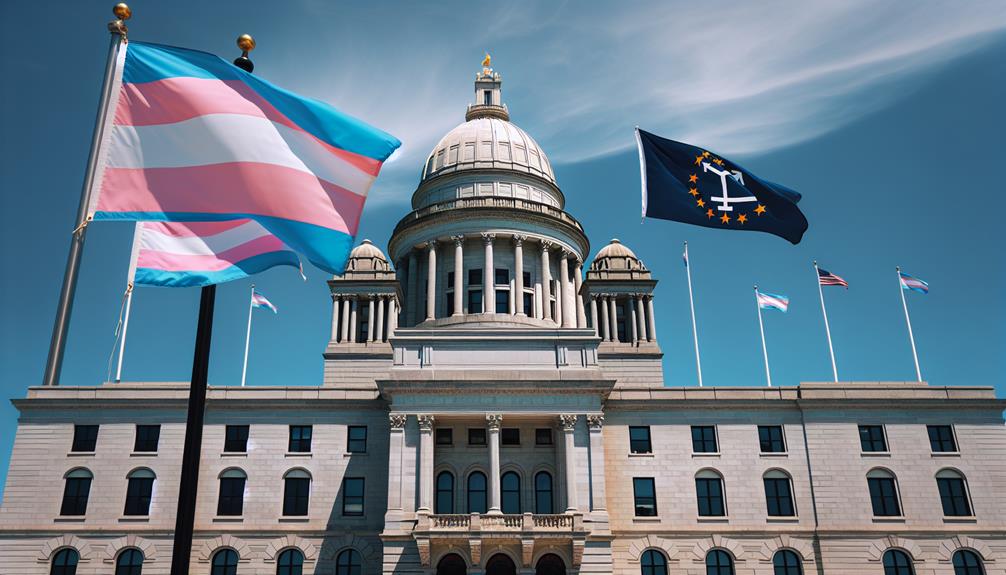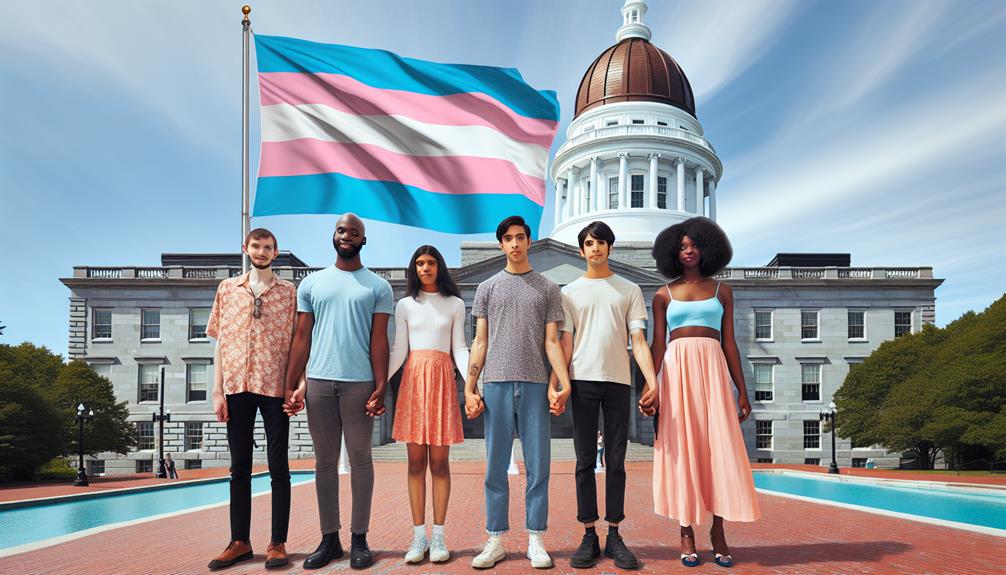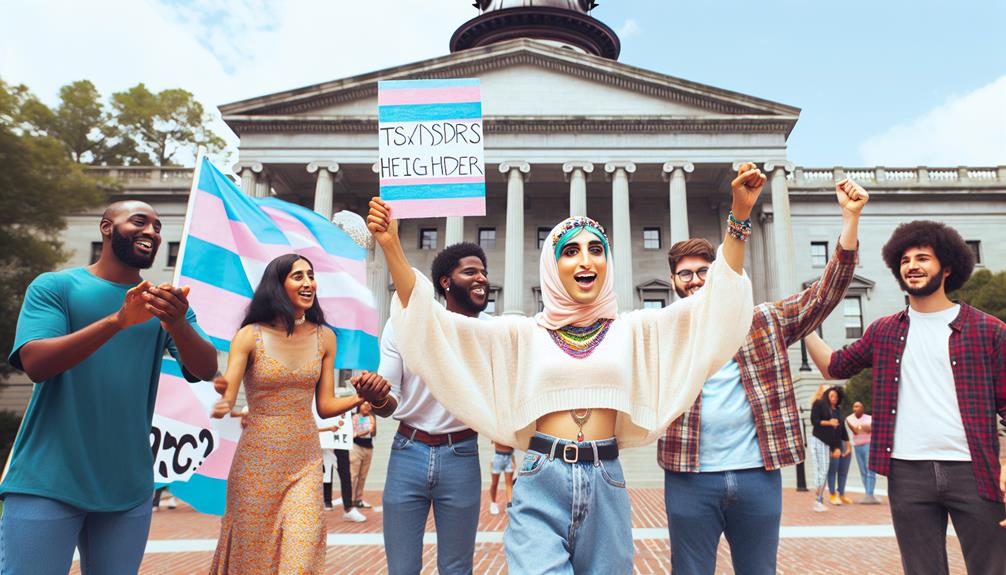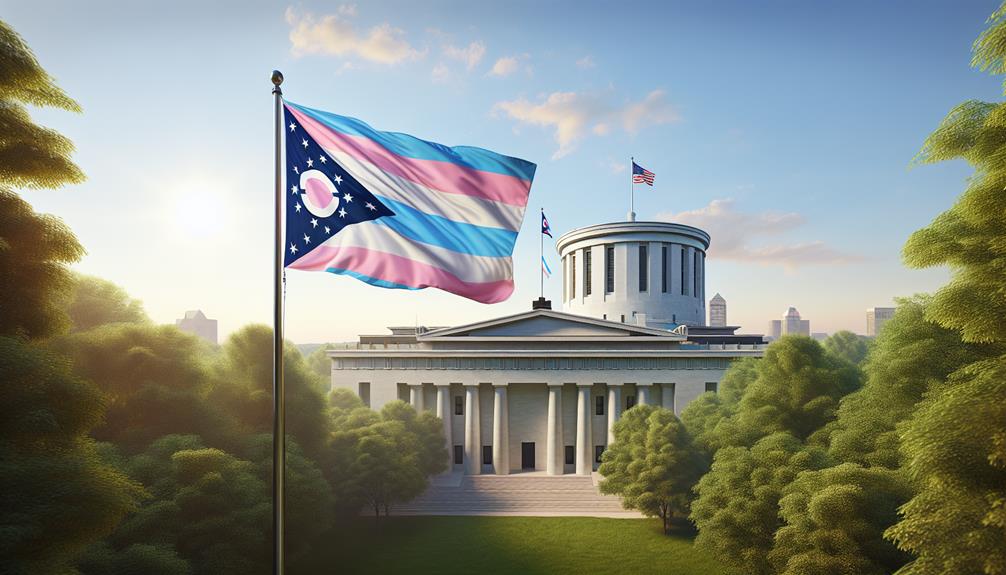
Discover the current state of transgender rights and issues in Alaska. Get informed and stay updated on the latest developments.
Table of Contents
ToggleAlaska Transgender State of Affairs
01/01/2024 – Amidst the rugged beauty of Alaska, a recent decision has sparked controversy and drawn attention to the state’s transgender community. With the recent ban on transgender girls from competing on high school girls’ sports teams, the issue of transgender rights has come to the forefront of public debate in the state.
This decision, while aiming to ensure fairness in sports, has ignited a broader discussion on the rights and inclusion of transgender individuals in various aspects of Alaskan society. The implications of this decision and the broader state of affairs for the transgender community in Alaska are complex and multifaceted, raising questions about equality, inclusivity, and the legal landscape of transgender rights in the state.
Key Takeaways
- Alaska is one of at least 22 states that have laws preventing transgender girls from playing on girls’ teams in K-12 schools, with some states extending the ban to college athletics.
- The ban on transgender girls in sports teams has raised concerns about discrimination and well-being, highlighting the need for improved access to gender-affirming healthcare.
- The recent ban on transgender girls in sports teams has sparked controversy and raised concerns about potential infringement on the civil rights of transgender individuals, intersecting with broader legal discussions and interpretations of Title VII.
- While Alaska law outlaws discrimination based on sexual orientation or gender identity in public and private employment, discrimination in housing and public accommodations is not addressed, and the issue of conversion therapy has yet to be addressed.
Legislative Landscape for Transgender Rights
The legislative landscape for transgender rights in Alaska reflects a contentious debate surrounding the participation of transgender girls in school sports.
In Alaska, the state board of education voted to ban transgender girls from competing on high school girls’ athletic teams. This regulation proposal aimed to ensure fairness in girls’ sports. However, similar proposals haven’t made it through the Alaska State Legislature.
At least 22 states have laws preventing transgender girls from playing on girls’ teams in K-12 schools, with some extending the ban to college athletics. Arguments for the ban are based on competitive fairness and safety concerns, citing potential performance differences between biological males and females in sports.
On the other hand, opposition to the ban emphasizes that transgender students aren’t seeking a competitive advantage. Instead, advocates for promoting acceptance, loyalty, and hard work in schools have arisen.
Governor Mike Dunleavy has been vocal about his opposition to transgender girls competing on girls’ sports teams and has called for a law to prohibit transgender women and girls from participating in female sports teams.
This ongoing debate showcases the complex intersection of gender, rights, and education in the public sphere.
Access to Gender-Affirming Healthcare
Amid ongoing debates about transgender rights, access to gender-affirming healthcare remains a critical issue for many individuals in Alaska. The state has made strides in recognizing gender identity and promoting LGBTQ rights, but challenges persist.
The recent decision by the Alaska Board of Education to ban transgender girls from competing on girls’ high school sports teams has sparked concerns about discrimination and the well-being of transgender youth. Additionally, the state Legislature’s involvement in such policies has raised questions about the overall support for transgender rights in Alaska.
Despite these challenges, there are positive developments. The State Human Rights Commission has been actively working to address discrimination based on gender identity, and some school districts have implemented inclusive policies to support transgender students.
However, gaps in access to gender-affirming healthcare still exist. Advocates continue to push for improved healthcare access and coverage for transgender individuals, emphasizing the importance of affirming and inclusive medical care for all. It’s evident that while progress has been made, there’s still work to be done to ensure equitable access to gender-affirming healthcare in Alaska.
Social Acceptance and Challenges
Despite ongoing challenges, transgender individuals in Alaska continue to face social acceptance issues that impact their daily lives and well-being.
The recent decision by the Alaska State Board of Education to ban transgender girls from competing on girls’ high school sports teams has sparked controversy and raised concerns about discrimination based on gender identity. This policy, a priority of Republican Governor Mike Dunleavy, is seen as a potential infringement on the civil rights of transgender individuals.
The proposal aims to ensure fairness for cisgender female athletes, but it has been met with criticism and legal challenges. The regulation, if implemented, would limit participation on a separate high school athletics team to females assigned female at birth.
This development has brought the issue of transgender rights to the forefront, echoing the ongoing national debate over gender identity and discrimination. The decision also intersects with broader legal discussions, including recent Supreme Court rulings and interpretations of Title VII, further shaping the landscape of social acceptance for transgender individuals in Alaska.
Legal Protections and Barriers
How do legal protections for transgender individuals in Alaska compare to those in other states?
In recent developments, the Alaska State Board of Education voted to ban transgender girls from competing on high school girls’ sports teams. This decision has sparked debate and raised concerns about the rights and inclusivity of transgender individuals. The ban reflects a policy priority of Republican Governor Mike Dunleavy, with the aim of ensuring fairness for cisgender female athletes. However, it has faced opposition from the Anchorage School District, which remains committed to providing a safe and inclusive school environment for all students.
In terms of legal protections, discrimination on the basis of sexual orientation or gender identity in public and private employment is outlawed throughout Alaska. However, the state law doesn’t address discrimination in housing or public accommodations. It’s important to note that the state has yet to address the issue of conversion therapy.
With ongoing debates and policy changes, the legal landscape for transgender individuals in Alaska is evolving. The role of organizations such as the State Commission for Human Rights and the stance of officials like Alaska Attorney General Treg Taylor will continue to shape the legal protections and barriers for transgender individuals in the state.
Progress and Persistent Obstacles
Progress towards inclusivity and understanding has been met with persistent obstacles in Alaska’s treatment of transgender individuals.
The state’s recent decision to ban transgender girls from participating in high school girls’ athletic teams has sparked intense debate and controversy. This policy decision has led to significant challenges in creating an inclusive environment for transgender students in Alaska.
The situation reflects the ongoing struggle to address discrimination based on gender identity in public and private spheres. Despite efforts to promote inclusivity and understanding, the ban underscores the persistent obstacles faced by transgender individuals in the state.
The following points highlight the current state of affairs:
- The Alaska State Board of Education’s decision to ban transgender girls from competing on high school girls’ athletic teams has raised concerns about discrimination based on gender identity.
- The Supreme Court ruled in favor of the ban, emphasizing the differences in performance between biological females and males.
- The Commission for Human Rights has been actively involved in addressing the implications of the ban and advocating for the rights of transgender students.
These developments underscore the complex and challenging landscape surrounding the treatment of transgender individuals in Alaska.
Frequently Asked Questions
What Are the Specific Challenges Faced by Transgender Individuals in Rural Areas of Alaska?
Transgender individuals in rural areas of Alaska face specific challenges such as limited access to healthcare, support services, and community acceptance. They may encounter isolation, discrimination, and lack of understanding from local populations.
These challenges can lead to mental health issues, lack of resources, and barriers to gender-affirming care. It’s important to address these issues and work towards creating a more inclusive and supportive environment for transgender individuals in rural Alaska.
How Does the Intersection of Race and Gender Identity Impact the Experiences of Transgender People in Alaska?
The intersection of race and gender identity significantly impacts the experiences of transgender individuals in Alaska. It adds layers of discrimination and marginalization, making it even more challenging to access resources and support.
This intersection creates a unique set of obstacles that can exacerbate the already difficult journey of self-acceptance and societal acceptance. This complex interplay calls for a comprehensive understanding and tailored support systems to uplift and empower transgender individuals of diverse racial backgrounds.
What Resources Are Available for Transgender Youth in Alaska, Particularly in Terms of Support and Mental Health Services?
Transgender youth in Alaska have access to various resources, including support and mental health services. These services aim to provide a safe and inclusive environment for young individuals to receive the support they need.
Support groups, counseling services, and outreach programs are available to help transgender youth navigate their unique challenges and develop positive mental health.
These resources play a crucial role in promoting well-being and a sense of belonging for transgender youth in Alaska.
Are There Any Specific Initiatives or Programs in Place to Address Employment Discrimination Against Transgender Individuals in Alaska?
Yes, there are specific initiatives and programs in place to address employment discrimination against transgender individuals in Alaska.
These include anti-discrimination laws that protect transgender individuals in the workplace and initiatives aimed at promoting inclusive hiring practices.
Additionally, there are resources and organizations that provide support and advocacy for transgender individuals facing employment discrimination, helping to ensure fair treatment and opportunities in the workforce.
How Does the Inclusion of Non-Binary and Gender Non-Conforming Individuals in the Conversation About Transgender Rights Impact Policy and Advocacy Efforts in Alaska?
The inclusion of non-binary and gender non-conforming individuals in the conversation about transgender rights impacts policy and advocacy efforts by broadening the scope of protections needed.
It necessitates a more comprehensive approach to address the diverse needs and experiences within the transgender community.
This inclusion encourages a more inclusive and intersectional approach to policy-making and advocacy, recognizing the unique challenges faced by non-binary and gender non-conforming individuals in accessing rights and protections.
Final Thoughts
The Alaska transgender state of affairs highlights the ongoing struggle for equality and inclusion for transgender individuals. Despite progress in some areas, there are still persistent obstacles and legal barriers that hinder their rights.
It’s an uphill battle, but the fight for acceptance and fairness continues to push forward, like a blazing comet streaking across the sky, leaving a trail of hope and determination in its wake.
Profile Author / Editor / Publisher
- Dora Saparow
- Dora Kay Saparow came out in a conservative Nebraskan town where she faced both misunderstanding and acceptance during her transition. Seeking specialized support, she moved to a big city, where she could access the medical, legal, and social resources necessary for her journey. Now, twelve years later, Dora is fully transitioned, happily married, and well-integrated into society. Her story underscores the importance of time, resources, and community support, offering hope and encouragement to others pursuing their authentic selves.
Latest entries
 News and AdvocacyNovember 14, 2025Rainbow Victories: 2025’s Most Pro-LGBTQ+ States Revealed
News and AdvocacyNovember 14, 2025Rainbow Victories: 2025’s Most Pro-LGBTQ+ States Revealed News and AdvocacyNovember 14, 2025Transgender Sanctuary States: Protecting Rights, Providing Hope
News and AdvocacyNovember 14, 2025Transgender Sanctuary States: Protecting Rights, Providing Hope Featured PostsNovember 13, 2025When Restroom Policing Backfires: The Hotel That Went Too Far
Featured PostsNovember 13, 2025When Restroom Policing Backfires: The Hotel That Went Too Far Featured PostsNovember 13, 2025Sex, Safety, and Seduction: A Trans Girl’s Guide to Hookups
Featured PostsNovember 13, 2025Sex, Safety, and Seduction: A Trans Girl’s Guide to Hookups


























